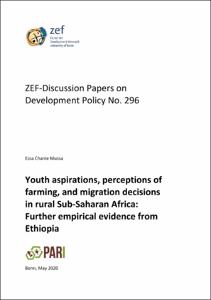Youth aspirations, perceptions of farming, and migration decisions in rural Sub-Saharan Africa: Further empirical evidence from Ethiopia

Youth aspirations, perceptions of farming, and migration decisions in rural Sub-Saharan Africa: Further empirical evidence from Ethiopia

| dc.contributor.author | Mussa, Essa Chanie | |
| dc.date.accessioned | 2022-01-26T10:21:17Z | |
| dc.date.available | 2022-01-26T10:21:17Z | |
| dc.date.issued | 05.2020 | |
| dc.identifier.uri | https://hdl.handle.net/20.500.11811/9571 | |
| dc.description.abstract | The study discusses the aspirations and preferences of youth in rural sub-Saharan Africa using a large-scale SMS-based survey data and complements it with an investigation on the causal effects of adolescent aspirations on migration decisions when youth in southwestern Ethiopia. The cross-country youth study shows that most rural youth in Africa prefer working in nonfarm economic sectors. It also finds that above half of the rural youth are undecided about their migration aspirations, providing an opportunity for governments to influence the rural out migration of youth. However, policymakers should also be equally aware that anti-poverty policy measures that simply improve the incomes of rural youth might have unpredictable and unintended consequences on their migration decisions. As a result, policy measures may have to also influence the perceptions of youth toward farming and rural life, and to make rural areas more attractive to the youth. Taking southwestern Ethiopia as a case in point, it was found that above half the adolescents have negative perceptions about farming (both farming life and the pre-requisites to become a farmer). The results also show that educational and occupational aspirations during adolescence exert differing effects on migration decisions after four years. That is, while those who aspired to attain more years of schooling are unlikely to out-migrate within this time period, their counterparts who aspired to have high socioeconomic status occupations tend to out-migrate from the respective areas. The study concludes that the out-migration of youth from rural areas and small towns may not be only due to push factors such as lack of farmland, but it could also be due to their aspirations to work in high socio-economic status occupations which are not often found in the rural areas. Thus, African countries should work to make rural areas and farming more attractive to the aspiring youth such as through improving access to technology, developing infrastructure, and providing support to rural non-farm sectors expansion. | en |
| dc.language.iso | eng | |
| dc.relation.ispartofseries | ZEF Discussion Papers on Development Policy ; No. 296 | |
| dc.rights | In Copyright | |
| dc.rights.uri | http://rightsstatements.org/vocab/InC/1.0/ | |
| dc.subject | Africa | |
| dc.subject | Agricultural production | |
| dc.subject.ddc | 300 Sozialwissenschaften, Soziologie, Anthropologie | |
| dc.subject.ddc | 333.7 Natürliche Ressourcen, Energie und Umwelt | |
| dc.subject.ddc | 360 Soziale Probleme, Sozialdienste, Versicherungen | |
| dc.title | Youth aspirations, perceptions of farming, and migration decisions in rural Sub-Saharan Africa: Further empirical evidence from Ethiopia | |
| dc.type | Arbeitspapier | |
| dc.publisher.name | Center for Development Research (ZEF) | |
| dc.publisher.location | Bonn | |
| dc.rights.accessRights | openAccess | |
| dc.relation.eissn | 1436-9931 | |
| dc.relation.doi | https://doi.org/10.2139/ssrn.3616359 | |
| dc.relation.url | https://www.zef.de/fileadmin/webfiles/downloads/zef_dp/ZEF_DP_296.pdf | |
| ulbbn.pubtype | Zweitveröffentlichung |




